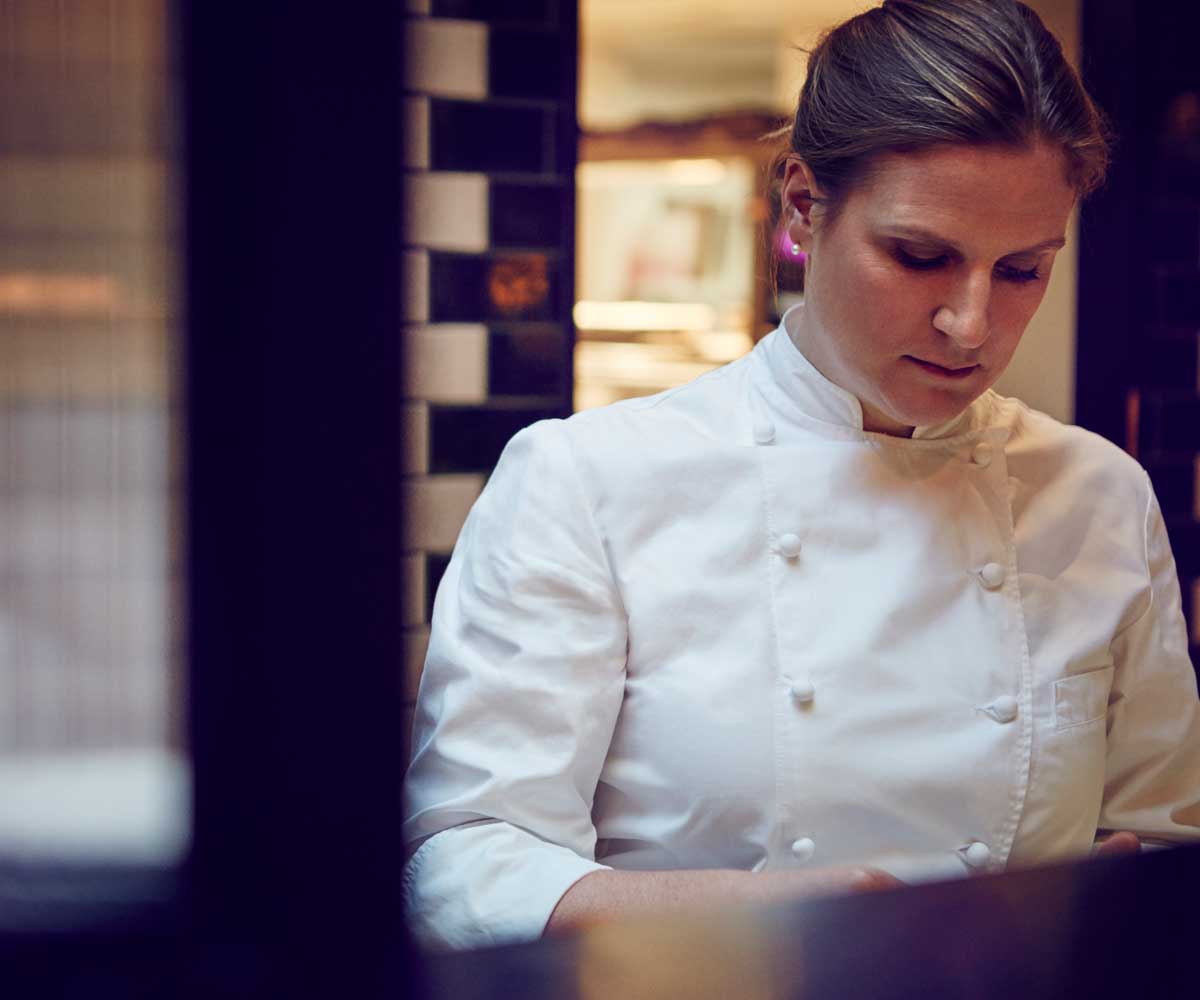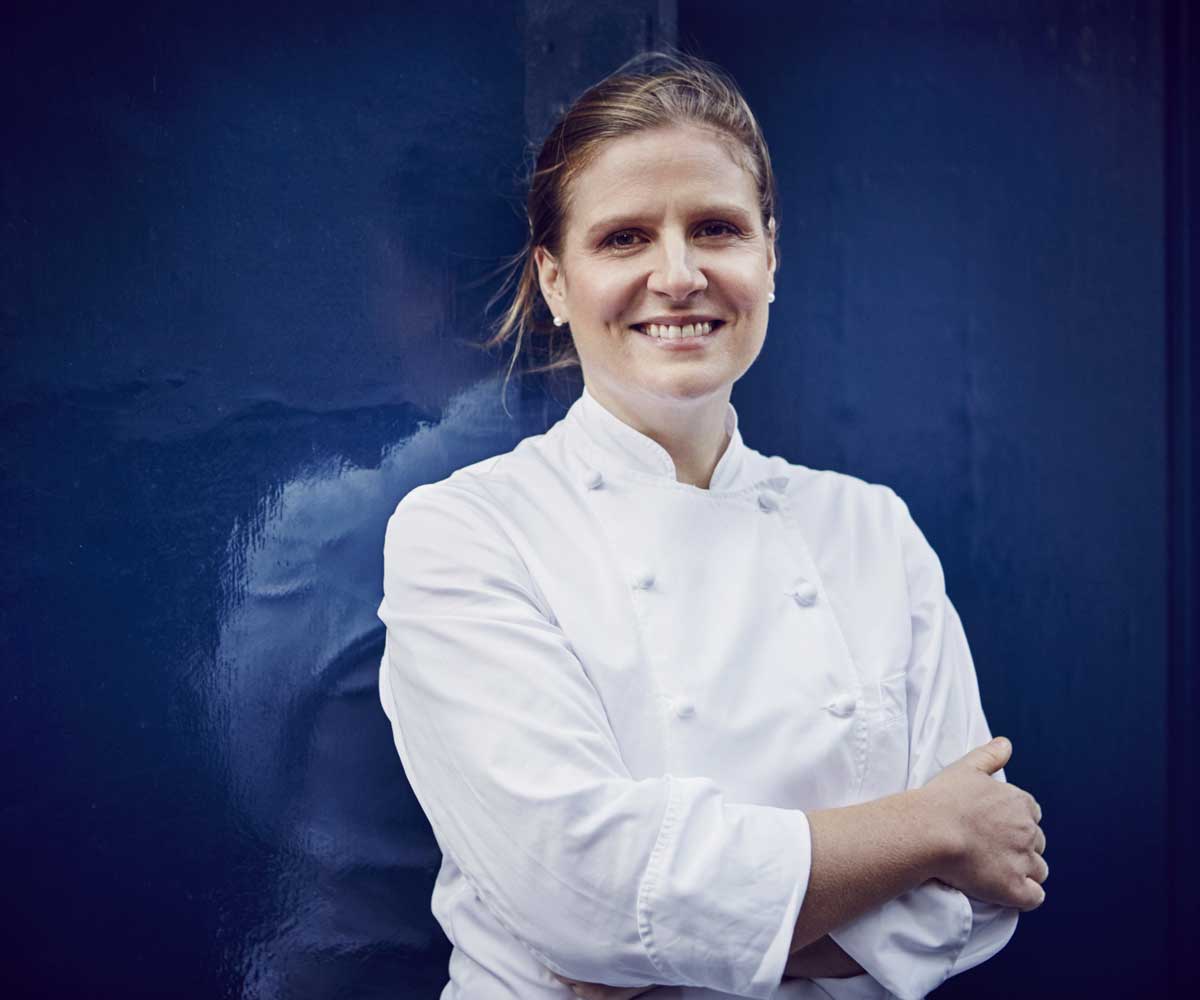On a mild summer evening in London’s Covent Garden, the rooftop bars are open, silver-painted human statues spellbind toddlers, and a beggar is using a traffic cone as a trumpet, with mixed results. The streets are filled with theatre-goers out for an early meal before their West End show.
At Marcus Wareing’s restaurant, Tredwells, in Upper St Martin’s Lane, opposite the trendy Indian street food eatery Dishoom, and Jamie Oliver’s less highly-rated Italian, it will be a big night. Three large parties are booked for 6pm. Their tables are already laid in the light-filled basement, beside the open kitchen. The chef has one eye on her laptop; the other glued to every dish sent out.
A plate is sent back to adjust a less-than-perfect swish of puree. Another must be rotated twice before being cleared for service. Perfection, Chantelle Nicholson knows, is attained by doing every task perfectly. It’s a philosophy that has taken her from a career in law in New Zealand to one of the most prominent positions in London’s culinary scene.
“My friends would say I’m very committed,” says Chantelle, who’ll return to NZ in March to be guest chef at Marlborough Sounds restaurant Waterfall Bay for Seresin Wine Estate’s 25th jubilee celebrations.
Wareing, one of Britain’s most ambitious and successful chefs, says, “When she is in the kitchen, her eyes can be felt all around the room, constantly checking, developing, pushing the chefs to meet her standards… She is capable of achieving anything.”

The story has its beginnings on a cherry orchard in Otago, owned by Chantelle’s uncle and aunt. Every summer, as a child, she would help to pick fruit and prepare preserves. She began to delve into her mother’s collection of Women’s Weekly cook-books, “especially the French ones”, and followed the recipes with varying success.
A bright pupil at Hamilton Girls’ High, she never considered food as a career. Two decades ago, it would have been an unusual choice for a female academic student. Instead she studied law. At her mixed flat in Otago, she was chief cook, but often frustrated on a student’s budget.
“Quite often we’d have to share one chicken breast between three.”
To fund her studies, she took a part-time job at the café Ground Essence in Dunedin, then later at Corstorphine House, the elegant category 1-listed hotel where Prince Charles, Gwyneth Paltrow and Daniel Craig have stayed.
“They saw I had some skills, and they employed me in the kitchen.”
The head chef had spent time in London and the food had a strong European, particularly French, influence.

By this stage, Chantelle knew her heart wasn’t in law, but, after graduating, she took a job with the banking ombudsman in Wellington, and was admitted to the Bar. On the side, she ran a small catering business.
Her course seemed set until she saw an ad in Cuisine for a ‘Chef Search’ to be run in New Zealand by British chef Gordon Ramsay. Applicants had to submit a written three-course menu. She can’t remember the starter or the pudding, but the main was a fillet of beef with blue cheese. She reached the semi-finals, but then had to show she could cook.
“I hadn’t been in a kitchen for 18 months. I rang Martin Bosley’s restaurant [then on Wellington’s Oriental Parade] and begged to be allowed to work there for one night.”
The other contestants were trained chefs with experience under their belts. She fudged and told them she wasn’t currently cheffing. Her dishes included a chocolate marquise – a rich dessert made from dark chocolate, butter, eggs and cream. For the final, the next day, she cooked venison.
New Zealand celebrity chef, Josh Emett, who was working with Ramsay at the time, was one of the judges. Coincidentally, he was also originally from Hamilton, Chantelle’s hometown and his parents had bought her parents’ house some years before.
“He said, ‘You can cook, you’re a Kiwi and I can see you’re a hard worker. Do you want a job at the Savoy Grill?” She resigned from her law job the next day.

Top kitchens are feral places. Inexperienced chefs are eaten alive by those hungry for success. When Chantelle was planted in the kitchen of one of London’s most prestigious restaurants, she could have been an easy target. She says she survived because she kept her head down and worked hard. “Plus, Josh had my back.”
The first time she heard him shout, she thought, “I’ll never survive that.” When she toppled over a tray stacked with 60 tall skinny shot glasses filled with chilled mango soup Emett just looked at her and said, “If you weren’t a Kiwi…”
But success did not come without pain. The next 20 months involved 18-hour days, dog-tired legs, sleep-filled days off and no social life. The pressure tested her resources and fortitude but she thrived on the atmosphere, energised by learning the ropes from some of London’s top chefs.
When Emett moved on to other things, Wareing tempted her to stay by offering her a job at the two-starred Knightsbridge restaurant Pétrus, which he then owned with Gordon Ramsay. Here she witnessed the ugly side of kitchens.
“The chef was an outright bully. Young staff couldn’t take it. They just left.”
When she, too, had had enough, Marcus – who was going through a messy business split with Gordon Ramsay – wooed her with an offer she couldn’t resist: establish and run a new restaurant in St Pancras Renaissance Hotel.

The 19th century hotel – rescued from dereliction six years ago at a cost of £150 million ($272 million) – is gob-smackingly glamorous. Built in 1873, it was the last and grandest of the railway hotels to serve passengers at major railway stations.
The restaurant – named The Gilbert Scott, after the hotel’s original architect – is just as opulent. But when Chantelle first saw it, it was still an empty shell in a somewhat dodgy part of town. The brief from the boss to his 29-year-old protégé was to create a restaurant that befitted the building’s grandeur.
It was the toughest thing she’s ever done. “And because I was stressed, I wasn’t a nice person to be around. I think I’d be described as ‘snappy’.”
She became ill from overwork and stayed in bed – with a laptop – for three days. But, alongside a love of food, she inherited grit and determination from her mother and grandmother. “My pride and stubbornness wouldn’t let me fail.”
The Gilbert Scott opened in 2011. “The food”, wrote British journalist and author John Lanchester, “is as wonderful as the venue. It is a thing of beauty.”
Chantelle says she wanted the menu to capture the history and Britishness of the hotel. She pored over recipes from Mrs Beeton’s Cookbook and included full-on retro dishes like Dorset mutton balls and snow eggs, an English version of îles flottantes with egg white, ‘burnt honey’ custard, peanuts (inside the egg) and fragments of toffee.
She developed two breads from Tudor recipes. Many of the customers, she says, were elderly and had worked or stayed in the hotel in its glory days.

Back at Tredwells, the kitchen is heating up as the first diners’ arrival nears. The restaurant does up to 250 covers a night, sometimes 400 on Saturdays. Chantelle wears a chef’s jacket; her blond hair tightly knotted in a bun, face bare of makeup.
The staff call her “Chef” or “Chantelle”. She’s not fussed about titles and doesn’t demand servility. A chef confirms the size of a fillet of beef. The phone rings. “Someone from The Gilbert Scott, wanting to check a detail.”
She manages with calm ease. “It’s not like MasterChef”, on she which appeared as a guest judge with four other top women chefs in 2015.
She is seemingly without ego, rare in a profession where chefs behave like rock stars. She says her aim is to attract and nurture talent and keep good staff. She’s proud her front-of-house manager at Tredwells began with her as a waiter at The Gilbert Scott.
Like Marcus Wareing, she believes the strength of a business depends on building people’s skills so they can operate independently. When she hires, she looks first for people with passion.
“We can teach the skills”.
One thing that worries her is that Brexit will reduce the number of talented young European chefs coming to Britain. Only 36 of the 180 staff at Wareing’s three restaurants are British-born.
“In the UK, cheffing and front-of-house roles are not seen as a great career path.”

One of her aims is to encourage more people into the trade.
“Being female, I feel more responsible to keep inspiring and motivating young staff.”
These days, she no longer works 18-hour days in the kitchen, but her feet still get sore from standing.
She goes to the gym at least three times a week and often walks from her flat, in the suburb of Angel, to work. Annual holidays are spent lying on a beach in Dubai reading crime novels.
Her happiest place is still on the job, driving new projects. She divides her time between Tredwells and The Gilbert Scott; loves them equally, but recognises their different personalities.
Tredwells is the newest member of the Wareing family, pitched at younger diners. It opened three years ago to mixed reviews. “I think the food was confusing,” she says now. She stepped back in the kitchen and sorted it out.
Do critics’ reviews upset her? “You can’t take things personally,” she says. What does upset her are customers who are rude to staff, and people who expect to get something for nothing. Customer satisfaction remains her focus and she welcomes any diet.
“If someone is a vegan or vegetarian, they shouldn’t be made uncomfortable. It should be easy.”

The food at Tredwells has Asian and Pacific influences, and there are several nods to her homeland. New Zealand wines from Seresin Estate feature on the wine lists. Sweetcorn fritters – a recipe adapted from the Edmonds Cookbook – are popular, served with sriracha mayonnaise.
She originally named them ‘beignets’. “But everyone kept asking what they were, so now we just call them corn fritters”.
She has learned over time the import-ance of naming dishes. “We once had fried chicken on the menu. It wouldn’t sell, so we re-named it ‘crispy buttermilk chicken’; now it flies out the door.”
Today, at 37, she is pleased but refresh-ingly unpretentious about her rise in London’s culinary circles. Her title in the Wareing empire is chef patron at Tredwells and group operations director, which means she keeps an over-reaching eye on everything in the business. She has some regrets about not beginning cheffing earlier, but says her training as a lawyer has been useful.
“When Marcus asked me to become more involved in the business, he asked if I knew how to use a computer. I said, ‘Actually I’m a lawyer, so yes, I do’.”
She’s writing a cookbook (she’s co-written others with Wareing) on plant-based food to be published in April. As well as developing young chefs, she wants to address food waste.
As the interview winds up, another young chef approaches: “Can I borrow a bottle lid?” he asks. “Only if you promise to return it,” she says, smiling.
“There are three things that go missing in kitchens,” she adds. “Bottle lids, spoons and peelers.” Even a woman who prides herself on meticulous attention to detail, can’t keep track of everything.
Chantelle is returning to NZ in March to be guest chef at Marlborough Sounds restaurant Waterfall Bay for Seresin Wine Estate’s 25th jubilee celebrations. Lunches and dinners, March 9 – 11, 2018. Bookings at seresin.co.nz.


